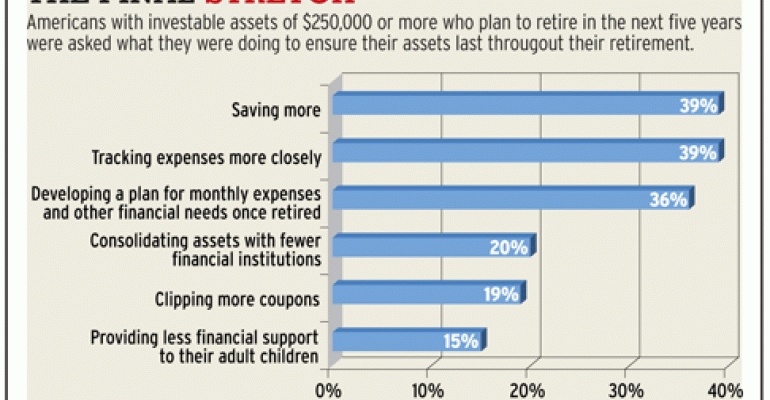Well-off investors with an eye on imminent retirement may be pinching their pennies more forcefully in the final stretch, a new Merrill Lynch Affluent Insights Survey suggests. Among those with investable assets of $250,000 or more who plan to retire in the next five years, 19 percent listed “Clipping more coupons” as a strategy to ensure that their assets last through the rest of their lives.
“I think that’s maybe a symptom across the country as the economy has taken its toll,” says Bill Hunter, the head of personal retirement solutions at Bank of America Merrill Lynch. “They know they’re transitioning into a lifestyle that may not have the same income sources as they did when they were working. Maybe they’re getting into a mindset of, ‘Let’s be prepared if we have to tighten our belts.’…It’s a mental transition as they approach retirement.”
To be sure, investors in the poll are doing more than just rummaging through the Sunday papers with a pair of scissors. Thirty-nine percent said they were “Saving more” and “Tracking expenses more closely.” The telephone survey polled a national sample of 1,000 individuals with investable assets of $250,000 or more, with a margin of error of +/- 3.1 percent.
The Merrill survey cited U.S. Census Bureau estimates that predict the number of people who will live to 100 by 2050 will reach 600,000, up from nearly 80,000 in 2010. A 65-year-old couple has nearly a one-in-three change of at least one spouse living past the age of 95, according to an actuarial estimate cited in the survey.
“Age is just a number,” as the dismissive saying goes, but among aging investors, the view may be taking deeper root as lifespan expectations grow. Merrill’s poll suggests that affluent investors are already adjusting their behavior to adapt to a longer time horizon. Thirty-nine percent plan to continue to work at least part-time during retirement, while 37 percent say they plan to work with their financial advisor to re-evaluate savings and investment strategies.
The Merrill Lynch found that just 14 percent of working investors over the age of 50 felt that “Hitting a certain age” was the factor that would most lead them to retire. It was surpassed by “Believing they have enough assets to live the lifestyle they want in retirement” (25 percent), followed by “Don’t plan to retire” (19 percent) and “A health condition (their own or a family member)” at 18 percent.
“It is unchartered territory, not only for themselves but really for the industry,” Hunter says. “The number of people reaching 100 is growing exponentially. They realize, more so than the previous generation, that this is a possibility that they have to plan for.”


